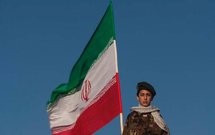 As the Islamic Republic of Iran holds its eleventh presidential election on June 14, most observers see the country as moving toward greater hardline clerical or military authoritarianism. However, the country’s hybrid political system is actually prompting a greater diffusion of power than ever before.
As the Islamic Republic of Iran holds its eleventh presidential election on June 14, most observers see the country as moving toward greater hardline clerical or military authoritarianism. However, the country’s hybrid political system is actually prompting a greater diffusion of power than ever before.
Leading pragmatic conservative and presidential candidate Hassan Rouhani got a boost when the lone reformist candidate, Mohammad Reza Aref, stepped down. Rouhani, who headed the country’s national security council from 1989 to 2005, also received the endorsements of former President Mohammad Khatami and of the country’s second-most influential cleric, Ayatollah Ali Akbar Hashemi Rafsanjani. Rouhani's primary challenges come from the current head of Iran's Supreme National Security Council, Saeed Jalili, and from the former mayor of Tehran, Mohammad Baqir Qalibaf, a former head of the Islamic Revolutionary Guard Corps' air force. Other candidates include Supreme Leader Ayatollah Ali Khamenei's top international affairs adviser, Ali Akbar Velayati, and the former head of the Islamic Revolutionary Guard Corps, Mohsen Rezaei. Compared to the others, these last two suffer from electability issues.
With the exception of Jalili, the candidates are to varying degrees pragmatists who have campaigned on an agenda of reform. They have promised improvements to the rule of law and to the economy, and better management of foreign policy. Their priorities show that even among Iran's conservatives, there is a strong desire to move away from the ideological policies that marked the tenure of incumbent President Mahmoud Ahmadinejad. There is a strong sense that the country has been weakened on both the domestic and foreign policy fronts.
Furthermore, Ahmadinejad’s presidency has been quite problematic for the supreme leader. Since Ahmadinejad’s first term, which started in 2005, the country’s conservative establishment has experienced hyper-factionalism, forcing the supreme leader to spend a great deal of time trying to disentangle rival factions locked in power struggles. During his second term, Ahmadinejad, even after Khamenei went out of his way to defend him in the last elections, turned against the supreme leader.
Meanwhile, Iran has come under increasing international pressure over the past eight years, especially on account of U.S.-led sanctions. This would explain why Khamenei favors a president who is both loyal and moderate -- one who can relieve external pressures on the Islamic republic, especially at a time when the Syrian crisis threatens core Iranian geopolitical interests. The word is that Khamenei prefers Velayati as the next president, but it is not clear whether he will get his wish.
The nature of the hybrid theocratic-democratic political system limits the supreme leader's ability to influence the outcome of the vote, as was clearly seen in the 1997 and 2001 elections of Khatami, someone who fell well outside Khamenei’s preferred conservative spectrum. This is why he tried to ensure a return to conservative control of the executive and legislative branches of government by having undesirable candidates barred.
The irony is that Khamenei did not gain control of the political system with this move. The conservatives have dominated both branches of government since 2005, but they have also engaged in policies that have undermined the republic. The net effect is that the system is being forced to return to politics of moderation.
It is not clear whether the next president will be subservient to the Khamenei-led clerical order. The next president will be pressed by objective geopolitical realities to pursue policies that Khamenei may not agree to. There is also the influence of the Islamic Revolutionary Guard Corps to consider -- this has been increasing, especially as a result of the infighting between Khamenei and Ahmadinejad. The elite military corps, while still beholden to Khamenei and the clerics, has grown into a major center of power. Beyond its military might, the corps exercises control over vast sectors of the economy.
The damage to the economy in the past few years has the Islamic Revolutionary Guard Corps seeking a government better equipped to manage the economy. This entails better management of foreign policy, where the country's leadership doesn’t capitulate on the nuclear matter or compromise too much on Iran’s regional ambitions, but is able to skillfully negotiate an easing of sanctions. Herein lies the dilemma: Arriving at an internal consensus is becoming difficult, because authority is becoming more diffuse as the imbalance of power grows among elected officials, clerics and the military.
Courtesy : Stratfor (www.stratfor.com)